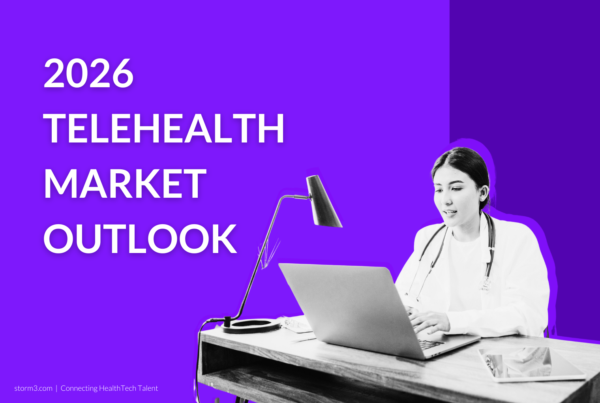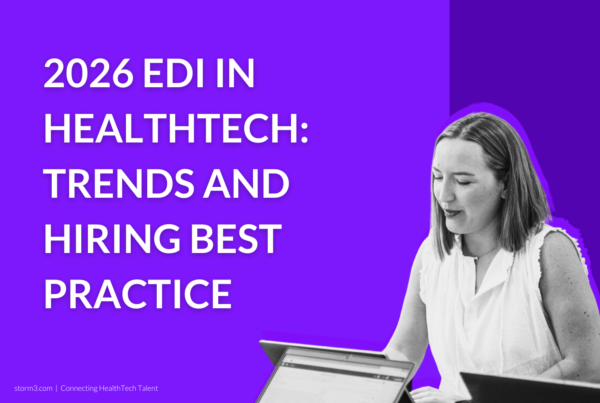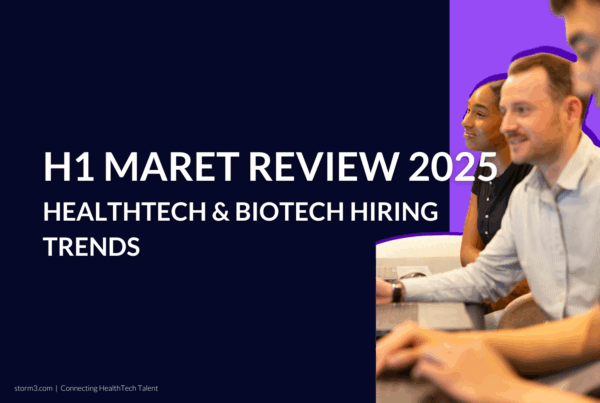The healthcare landscape continues to evolve quickly, and 2026 is shaping up to be a pivotal year for HealthTech innovation. As the industry faces growing demand for smarter, more accessible care, several key trends are driving change – from advanced AI applications and virtual care expansion to the shifting regulatory environment.
These developments are creating new opportunities for startups and scale-ups, and they’re reshaping hiring priorities across technical, clinical, and operational roles.
Here’s a look at the major trends defining HealthTech in 2026, with insights that will resonate with hiring managers seeking progressive leaders and skilled teams.
AI’s Larger Role Across the Health Ecosystem
Artificial Intelligence is no longer just an emerging tech buzzword – it’s now deeply embedded across healthcare workflows. In 2026, AI is advancing beyond diagnostics into drug discovery, personalized treatment plans, clinical decision support, and automating administrative tasks. Generative AI models are increasingly helping produce synthetic medical data, safeguard patient privacy, and improve model training.
AI-powered tools also relieve clinician burnout by automating documentation and streamlining workflows, freeing medical staff to focus on direct patient care. The emphasis on real-time insights for proactive intervention marks a fundamental shift to predictive medicine.
Growth of Virtual Primary Care
Virtual primary care is expanding rapidly, driven by patient convenience and technology improvements. Telehealth platforms now offer integrated services that go beyond video consultations – they include remote monitoring via connected devices, digital triage, and AI-powered symptom checkers that help guide care pathways. This shift means more patients receive timely, continuous care without the friction of in-person visits.
In 2026, “telemedicine 2.0” embraces comprehensive virtual hospitals and IoT-enabled devices, ensuring holistic remote patient care. This model enables providers to track health metrics like heart rhythm, glucose levels, or respiratory function in real-time, increasing engagement and reducing hospitalizations through early intervention.
Advances in AI-Driven Drug Discovery
HealthTech is playing a growing role in accelerating drug development. AI models analyze vast biomedical datasets to identify new candidate molecules, optimize clinical trial design, and predict drug interactions. These innovations shorten development cycles, lower costs, and open new possibilities for personalized therapeutics tailored to genetic profiles.
Collaborations between AI startups and pharmaceutical incumbents are expanding, underscoring the need for tech talent fluent in machine learning, biology, and regulatory landscapes. This blended expertise of AI-driven drug discovery is becoming vital for teams aiming to bring novel treatments to market faster at scale.
Regulatory Updates and Compliance
Regulation is intensifying around digital health solutions, AI tools, and data privacy. Governments and agencies are establishing clearer frameworks for the safe deployment of AI in clinical settings and enforcing robust cybersecurity standards in HealthTech platforms. Compliance demands are reshaping product roadmaps and clinical validation strategies.
Companies that build compliance and transparency into their design and development processes from the start will gain a competitive edge. Teams with experience navigating FDA approvals, HIPAA requirements, and international data laws are in high demand to ensure innovations reach patients both safely and efficiently.
Interoperability and Data Integration
Fragmented healthcare data remains one of the biggest barriers to coordinated care. 2026 sees increased momentum toward seamless data interoperability – connecting electronic health records, wearable devices, and patient-generated health information into unified digital health ecosystems.
Integrated platforms provide clinicians with comprehensive, longitudinal views of patient health, enabling personalized care plans and improved outcomes. The rise of “digital health operating systems” seeks to streamline patient journeys across providers and payers.
Increased Focus on Mental and Behavioral Health Delivery
Mental health continues to command more attention within HealthTech. Both virtual therapy and AI-enabled cognitive behavioral tools are scaling rapidly to meet growing demand. Platforms are offering more personalized, evidence-based approaches designed to reduce stigma and improve access.
Employers are investing heavily in mental health benefits, prompting growth in corporate wellness platforms that integrate mental and physical health tracking and coaching.
Emerging Tech: AR/VR and 3D Printing Use Cases
AR and VR technologies are finding practical use in clinical training, surgical assistance, pain management, and rehabilitation. Headset sales and adoption by healthcare providers are increasing as these tools prove effective in improving patient outcomes and clinician precision.
3D printing continues to gain traction for custom prosthetics, implants, and experimental bio-printed tissue research, offering promise for future organ replacement therapies.
Expansion of Remote Patient Monitoring (RPM)
Remote Patient Monitoring continues to grow beyond basic vital sign tracking. Advanced sensors and wearable devices now monitor complex health metrics such as blood oxygenation, cardiac events, medication adherence, and glucose fluctuations in real time. Integration with AI enables predictive alerts and personalized care adjustments at home, reducing hospital readmissions and emergency visits.
For HealthTech companies, this means a rising demand for engineers, data scientists, and clinical experts who can innovate reliable, user-friendly RPM solutions that integrate seamlessly with existing care models.
Consumer-Driven Healthcare Platforms
Patients are increasingly seeking control over their health data and care decisions. Consumer-driven platforms that offer health insights, direct-to-consumer testing, genomic reports, and personalized wellness plans are gaining momentum.
These platforms prioritize transparency, education, and empowerment, aligning with broader societal shifts toward personalized, preventative care. For employers and startups, this trend fuels growth in patient-centric product development, requiring talent adept at UX design, data security, and behavior change technologies.
Blockchain for Health Data Security and Interoperability
Blockchain technology is carving a niche in addressing healthcare’s data privacy and interoperability challenges. By providing decentralized, tamper-proof records, blockchain enables secure sharing and verification of patient data across providers and payers while maintaining patient consent controls.
In 2026, more HealthTech firms are piloting blockchain solutions to enhance data integrity, streamline billing, and assure compliance with evolving privacy regulations. Hiring managers should look for candidates with backgrounds in cybersecurity, distributed ledger technologies, and healthcare regulation to build resilient and trustworthy platforms.
Building the Future of HealthTech Together
These shifts demand specialist teams with deep expertise across AI, software engineering, clinical sciences, regulatory affairs, and data analytics. Whether you’re scaling virtual primary care, developing AI drug discovery platforms, or building compliant and interoperable HealthTech products, attracting the right leaders and senior talent makes all the difference.
Storm3 partners with HealthTech startups and scale-ups at the forefront of these innovations, connecting you with senior professionals across Data & Analytics, Software Engineering, Finance & Operations, Sales & Marketing, and Product Management who understand both the technology and the healthcare ecosystem. Let us help you find the candidates who will drive your growth and innovation in this dynamic market.
If you’re looking to build a team that’s ready for 2026 and beyond, get in touch with Storm3 to explore how our recruitment expertise can support your mission and accelerate your impact.





